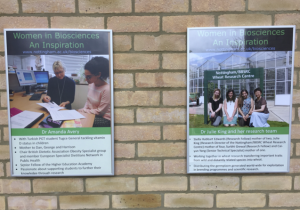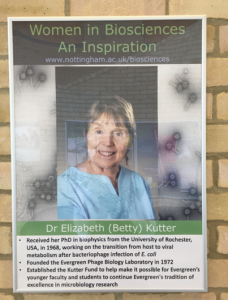May 14, 2018, by Simon Langley-Evans
Our Women In Biosciences Campaign

In the School of Biosciences we are very conscious of a ‘leaky pipeline’ of progression of women from undergraduate student up to professor. The students joining our undergraduate and postgraduate courses are predominantly female (around two thirds) and 54% of our postdocs and research associates are women, but by the time we get to academic posts we find that only 40% of assistant professors, 18% of associate professors and 13% of professors are women.
There are of course many reasons why women don’t progress through the academic ranks, but one that we have previously identified is a lack of role model visibility. We have tried to address this in several ways, including the use of some new imagery around the Sutton Bonington Campus. The Women in Biosciences poster campaign is growing across the Campus. Posters featuring eminent women from across our range of subject areas and showing women currently in the School have been hung in high footfall communal areas (e.g. the student amenities building and the teaching laboratory).
Among the women currently featured in the poster campaign are:
Professor Dame Nancy Rothwell: Eminent Neuroscientist and Vice Chancellor of the University of Manchester (and my PhD external examiner!)
Professor Rosemary Pangborn: Pioneer of sensory evaluation techniques.
Elsie Widdowson: Eminent nutritionist- one of the founders of the nutrition science field.
Professor Anna MacGillvray: Brewing scientist
Professor Anne Willis: Cancer biologist
Dr Betty Kutter: Eminent bacteriophage biologist
Dr Fiona McCullough (School of Biosciences): Director of Teaching and Learning
Dr Amanda Avery (School of Biosciences): Associate Professor of Dietetics
Dr Julie King, Dr Surbhi Grewal, Dr Stella Edwards, Dr Caiyun Yang (School of Biosciences): Wheat Research Group.
Professor Chris Dodd and Delveen Ibrahim (School of Biosciences): Professor of Food Microbiology and PhD student.

We intend to have more posters in this campaign, featuring more of our own local stars. We hope that the success of these women will inspire other women to pursue a career in academia, whether as a lead investigator, postdoc, technical specialist or in a research administrative role.
If you have any suggestions of women who we could feature, do get in touch.
Simon Langley-Evans
Head of School

I notice these images have come down and the corridor now (*even*) has an apparently male person’s photograph visible during open days!!!
Was this because we realised that we might actually like some male students to apply? Has the intake perhaps become (even) more female biased since the Athena Swan female-only campaign started? I note that student applications have dropped – is this disproportionately due to males being discouraged from applying to this (obviously male intolerant/disinterested) campus?
I do understand that the AS campaign is solely aimed at improving the promotion prospects for older white alpha swans – but it would be nice to be a little more egalitarian and perhaps even consider how to focus on the lack of males at the ‘bottom’. The unbalanced gross numbers are far, far higher – but obviously less personally interesting to the people pushing the agenda – unless they have sons that is !!! Don’t the needs of the many have any interest to the politics of the few? Meritocratic bias can be applied at all points of the gender rainbow.
Dear Anonymous
Thank you for taking the time to comment on our blog post. I am really sorry that you don’t like our Women in Biosciences Campaign and appear to be somehow threatened by it. We would just like to make a few points to put the record straight, as you appear to have hugely misjudged the purpose of the campaign and the intent of Athena SWAN.
Athena SWAN is about equality. It isn’t some white feminist conspiracy to drive out the men or non-white minority, The drive is equality. I am an Athena SWAN panellist and in my experience of a reviewer I have seen departments suffer because they have a majority of women and men are getting a rough deal- it’s not just the other way around, Institutions and departments are rewarded for recognising where inequalities lie and putting in place actions to deal with those inequalities. That could be to hire more women, or to promote more men; to support women through maternity leaves; or support men in working flexibly to fit in childcare responsibilities. There is no gender bias.
Biosciences is also committed to equality and to ensure that nobody encounters barriers in their careers due to their gender, ethnicity, religion, sexuality or any other characteristic.
In Biosciences we have two clear problems to tackle over the next few years, one of which is reflected in our recent Athena SWAN Silver award and another which is not Athena SWAN related. Firstly we have a woeful lack of women in senior academic positions. Although most of our degrees (all in fact except Biotechnology) over-recruit women (around 2/3 of our undergrads are women- this is typical of all biosciences degree courses) and a similar proportion of our postdocs are women, less than one in 5 of our professors are women. I see no evidence of bias against men here, so clearly we need to take action to drive for equality at professor and associate professor level- hence the Women in Bioscience campaign to try to inspire young women to follow an academic career. Our other problem is recruitment of black and minority ethnic staff. We have very few in Biosciences and this is something we need to address. Some images of BAME men and women should be our next step in the campaign.
Simon Langley-Evans